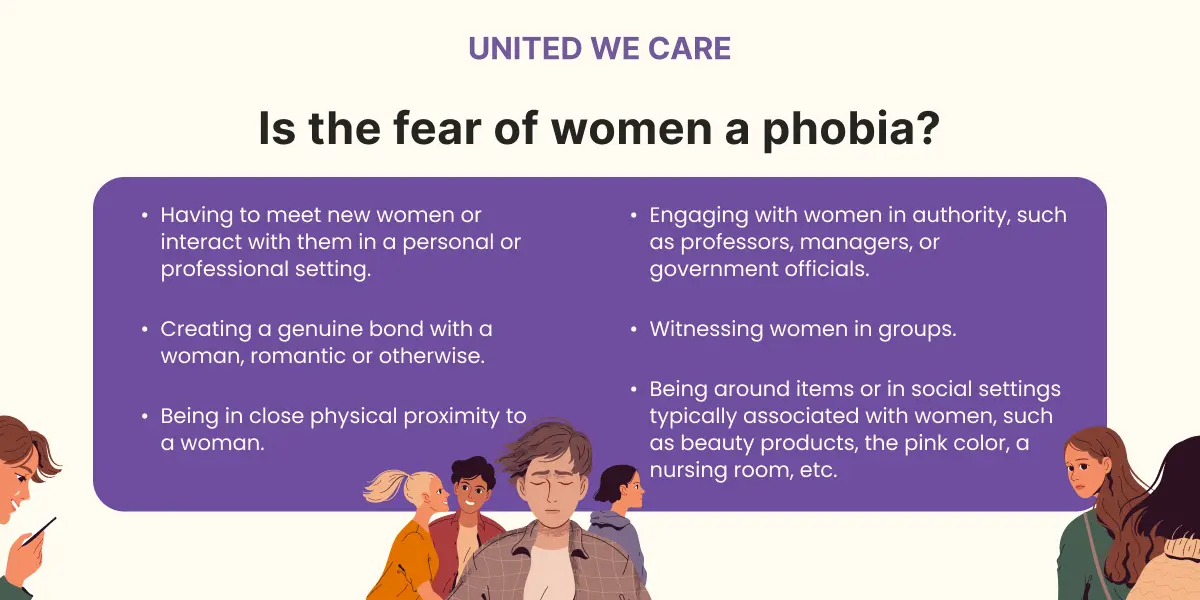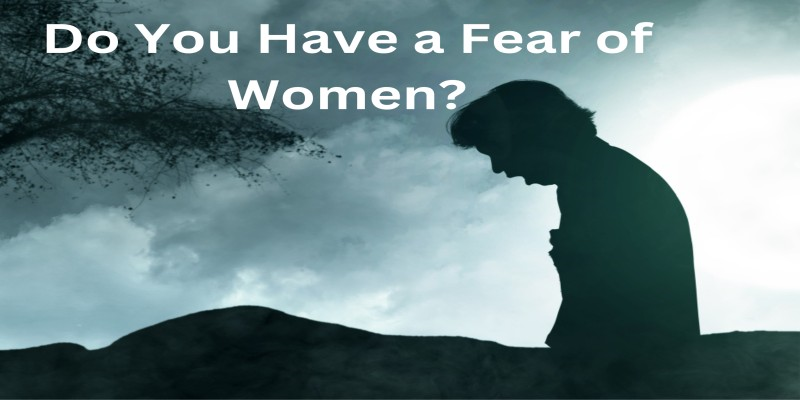Introduction
You may have heard of an intense fear of creepy crawlies or heights, but have you heard of the fear of women?
Fear is an important human emotion. When we’re under threat, our fear helps kick in our fight or flight response, hence protecting us from real danger. But sometimes, we may feel fearful even if there is no real threat. In that case, our fear can be considered irrational as it’s not helping us in any way and, in fact, is keeping us from living our lives normally and peacefully. This can also be known as a phobia, which is a type of anxiety disorder.
Phobias are usually accompanied by a lot of distress and physical symptoms of panic. A less discussed and understood phobia is that of women, also known as gynophobia. Let’s dig deeper into how this fear manifests and how you can turn your intense fears into a more manageable level of fear to improve your well-being.
What is the fear of women?
The fear of women is complex and often misunderstood. Let’s try to understand it through an instance. Imagine this: you’re at a cafe browsing at what to order. You’re standing in the line to place your order, but as you approach the counter, you see that the barista is a woman. She’s cheerful, and there’s no real reason for you to be scared. But you start dreading having to engage with her, even though it’s just to place your order. Your palms start sweating, you’re constantly rehearsing your order, and when it’s your turn at the counter, you try your best to avoid eye contact. As soon as your interaction with her is over, you feel a sense of relief as well as frustration from having to go through that.
This is what an overwhelming fear of women can look like. You may become severely distressed, mentally and physically, in the presence of women and go to huge lengths to avoid any interaction with them. Your logical thinking may go out the window, and you feel helpless despite this awareness. This can really hinder how you function in your daily life.[1] Fear of women can be situational or specific to all women and can affect both men and women.
Is the fear of women a phobia?
If your fear of women is negatively impacting your day-to-day functioning, then it can be categorized as a phobia. The words “gyne” and “Phobos” in Greek mean woman and dread, giving birth to the term “gynophobia,” which is the intense fear of women. If you are gynophobic, you might experience fear in situations such as:

- Having to meet new women or interact with them in a personal or professional setting
- Creating a genuine bond with a woman, romantic or otherwise
- Being in close physical proximity to a woman
- Engaging with women in authority, such as professors, managers, or government officials
- Witnessing women in groups
- Being around items or in social settings typically associated with women, such as beauty products, the pink color, a nursing room, etc.
While there is no single known cause for gynophobia, a combination of genetic, environmental, neurological, and societal factors can increase the chances of developing it, such as:
- Having a traumatic personal experience with women, such as harassment or emotional abuse, can create a strong association between women and fear.
- The prevalence of anxiety disorders in your family, including phobias, can increase your chances of getting it.
- Learned behavior as a child from a parent, sibling, or close relative who was fearful and cautious of women.
- Abnormalities in the functioning or structure of the amygdala and the hippocampus regions of your brain can cause you to have exaggerated fear responses and, hence, phobias.
- Cultural teachings and stereotypes, such as women being manipulative or a source of temptation, lead to strict beliefs about a sense of separation and danger.
Do you have a fear of women? How do you know?
If you have an intense fear of women, there are clear psychological, physical, cognitive, and behavioral signs and symptoms [2] you can look out for.
Psychologically, you dread even the thought of interacting with men. You experience overwhelming anxiety and even panic attacks in the presence of women. You go to great lengths to avoid interacting with women and, in the process, keep yourself from social situations and professional opportunities. Because of how much you fear being around women, you’re always on the lookout for them in your surroundings, which makes you hypervigilant.
Physically, you experience symptoms such as trembling, increased heart rate, sweating, shortness of breath, dizziness, and stomach distress when you have to interact with women.
Cognitively, you understand that your fear is not rational, but you feel helpless in front of it. You may have trouble focusing on whatever you’re supposed to be doing because of how much you’re preoccupied with wanting to avoid women. Your decision-making process may be clouded, so it leads to poor judgment in any situation involving women.
Behaviourally, you have an intense desire to escape any situation involving women. You may constantly need reassurance that you’re going to be okay when you’re in a public place with women. Stories revolving around women make you anxious, so you avoid movies, books, or news that involve them.
How do we overcome the fear of women?
Psychotherapy is commonly used to treat gynophobia. Different types of therapies can help manage your fears and triggers, such as:
- Cognitive behavioural therapy: CBT focuses on identifying and altering thought patterns and behaviors that do not serve you to those that do. As you change your thoughts, you are able to change your reactions to a situation involving women.[3]
- Exposure therapy: In this therapy, you will be gradually exposed to your fears in a safe, clinically controlled setting; hence, in this case, you will be made to interact increasingly with women. This way, you’ll be able to make your fear of them more manageable and reduce your phobic reaction to being around them over time.
In some cases, your doctor may also prescribe you antidepressants or anti-anxiety medication to treat your physical symptoms of phobia.
Becoming aware of the irrationality of your fears and understanding the social dynamics between genders is key to learning to manage this condition.
You may also practice techniques such as deep breathing when you’re feeling overwhelmed and meditation to make you more mindful.
Conclusion
Gynophobia is an intense and irrational fear of women. This condition can be caused by a combination of factors such as your genes, environment while growing up, brain functioning, and the society you live in. Experiencing this condition can be really distressing as it has psychological, physical, and behavioral manifestations. Psychotherapies such as cognitive restructuring and exposure therapy have been proven the most effective in the treatment of phobias. At United We Care, we offer the most appropriate, clinically backed solutions for all your needs for well-being. If you wish to seek help for your anxiety and fears, book a session with one of our mental health experts today.
References:
[1] American Psychological Association, “Phobia,” in APA Dictionary of Psychology. [Online]. Available: https://dictionary.apa.org/phobia. Accessed on: Nov. 8, 2023
[2] NHS, “Symptoms – Phobias,” NHS UK. [Online]. Available: https://www.nhs.uk/mental-health/conditions/phobias/symptoms/. Accessed on: Nov. 8, 2023
[3] Thomas Straube, Madlen Glauer, Stefan Dilger, Hans-Joachim Mentzel, Wolfgang H.R. Miltner, Effects of cognitive-behavioral therapy on brain activation in specific phobia, NeuroImage, Volume 29, Issue 1, 2006, Pages 125-135, ISSN 1053-8119,
https://doi.org/10.1016/j.neuroimage.2005.07.007. Accessed on: Nov. 8, 2023










